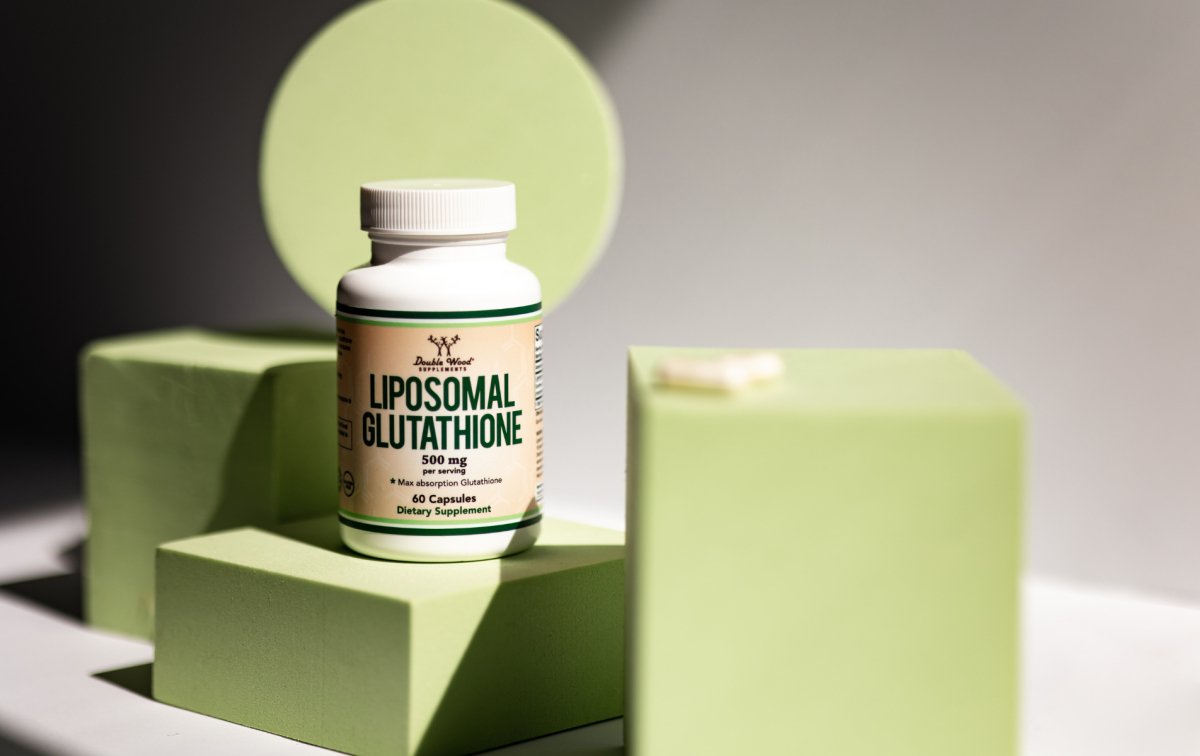This powerful antioxidant is gaining popularity as a nutritional supplement due to its wide range of exciting benefits. Here is what the latest research says.
It’s easy to feel like the world is trying to make us feel sick, tired, and speed up our aging process—especially today. Some of the biggest culprits include airborne pollutants, processed food, toxic chemicals, and ultraviolet (UV) radiation. These and other agents work together to increase oxidative stress in our bodies, creating highly reactive molecules called free radicals that can cause severe damage to our cells.
This is why antioxidants are so important. Antioxidants are any compounds in the body that help to break down free radicals and reduce oxidative stress. Liposomal glutathione is a particularly potent antioxidant because it helps the body produce, use, and recycle other types of antioxidants, such as Vitamins C and E.
What is liposomal glutathione?
Glutathione is an antioxidant compound in the cells of nearly every type of organic life on earth. It is made out of the amino acids glutamine, glycine, and cysteine. Glutathione is synthesized by the body naturally and is present in a wide range of foods, such as garlic, spinach, and avocados.
Because our glutathione levels drop as we get older and it is so difficult to get enough glutathione through a natural diet, many people are turning to supplements to increase their levels of this vital antioxidants.
Liposomal glutathione is a form of the compound that has undergone a specialized process to encase the molecule inside a lipid. This protects the molecule from being broken down in the bloodstream and increases its absorption levels, known as bioavailability.
Five Biggest Potential Health Benefits of Liposomal Glutathione
Multiple studies support the following positive antioxidant effects on the body by glutathione:
- Supports Gut Health
The lining of our intestinal tract is built to absorb the essential minerals and nutrients from food while keeping toxins and other unhealthy substances out. As we get older, our intestinal linings become less able to do this efficiently—a phenomenon sometimes known as leaky gut syndrome. This can lead to several adverse effects, including fatigue, inflammation, and digestive issues.
Among its many benefits, liposomal glutathione is associated with helping build a more robust gut lining, improving the absorption of good nutrients, and keeping out toxins.
- Protects the Liver and Kidneys
Glutathione also helps support the body’s next key line of defense against toxins: the liver and kidneys. These organs produce glutathione to detoxify our blood properly. But factors like age, poor diets, and alcohol consumption can negatively affect the liver and kidneys and prevent them from doing their job.
Limited studies have shown that supplementing with glutathione can improve liver and kidney function, possibly preventing disorders like nonalcoholic fatty liver disease.
- Boosts Your Energy
Fighting inflammation and oxidative stress robs our cellular powerhouses of the energy needed to perform essential functions. This can mean a reduced ability to do everything from working around the house, performing at your job, exercising, and enjoying recreational activities.
Supplementing with liposomal glutathione boosts your ability to win the war against free radicals, reducing inflammation and freeing up your body’s energy for the things you want to do.
- Helps Your Skin
According to a 2017 study, glutathione may also have a significant anti-aging effect on your skin. After supplementing with glutathione for 12 weeks while participating in a randomized, double-blind, placebo-controlled trial, healthy female subjects reported improved skin elasticity and fewer wrinkles.
- Benefits Your Brain and Mood
One of the most exciting potential benefits of liposomal glutathione supplementation is its ability to improve brain function and help manage a number of mood disorders, including anxiety and depression. Like in other organs, by fighting off oxidative stress caused by free radicals, glutathione can help reduce damage to brain cells and improve function.
There is even evidence that increasing glutathione levels in the brain can positively affect mental health. One 2014 study found that anxiety disorders may have a solid link to oxidative imbalance and low glutathione levels in the brain. Supplementing can be vital in increasing these levels and successfully managing these conditions.
What to Know About Supplementing With Liposomal Glutathione
Experts recommend dosages of 250-500 mg of liposomal glutathione a day as a dietary supplement. Double Wood Supplements, a leading maker of quality nutritional supplements, offers a Liposomal Glutathione in a highly bioavailable 250 mg capsule. All supplements are manufactured in the USA, independently analyzed, and third-party lab tested for safety.
What side effects should I be prepared for?
Liposomal glutathione is generally well tolerated when taken at the recommended dosage. Adverse side effects are not frequently reported among patients. Long-term glutathione supplementation has been shown to lower zinc levels in some cases, but this can be easily countered by increasing dietary zinc or through supplementation.
There is limited evidence to show that inhaled glutathione may trigger attacks in people with asthma, but there is no evidence that this applies to orally ingested glutathione. Please consult your doctor before taking liposomal glutathione, particularly if you have been diagnosed with asthma.
How much are liposomal glutathione supplements?
Liposomal glutathione capsules are available through Double Wood Supplements for $29.95 for 60 250 mg capsules. Interest-free payments and reduced subscription rates are available. Double Wood Supplements also offers a reduced rate for bulk purchases.

